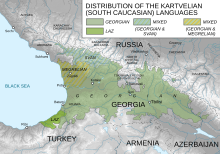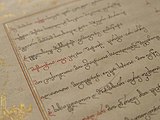Svans: Difference between revisions
PlatonPskov (talk | contribs) Template, image in the sequence of topics |
Undid revision 491382579 by PlatonPskov (talk)Discuss first on Talk page |
||
| Line 1: | Line 1: | ||
{{about|a people in the Caucasus|other meanings|Svans (disambiguation)}} |
{{about|a people in the Caucasus|other meanings|Svans (disambiguation)}} |
||
{{Infobox ethnic group |
|||
|group = Svans<br/>{{lang-ka|სვანი ''Svani''}} |
|||
|image = |
|||
|population = [[Circa|c.]] 14,000<ref name="joshuaproject"/> - 30,000<ref name="DoBeS"/> |
|||
|popplace = {{flag|Georgia}} 14,000<ref name="joshuaproject">[http://www.joshuaproject.net/peoples.php?peo3=19064 Joshuaproject. Svanetian, Mushwan]</ref>-30,000<ref name="DoBeS">[http://www.mpi.nl/DOBES/projects/svan DoBeS (<u>Do</u>kumentation <u>Be</u>drohter <u>S</u>prachen, Documentation of Endangered Languages)]</ref> |
|||
|region1 = {{flagcountry|Russia}} |
|||
|pop1 = 45 (2010)<ref name="census.2010">[http://www.gks.ru/free_doc/new_site/perepis2010/perepis_itogi1612.htm Russian census 2010]</ref> |
|||
|languages = [[Svan language|Svan]], [[Georgian language|Georgian]], [[Russian language|Russian]] |
|||
|religions = Predominantly '''† [[Eastern Orthodox Christianity]]'''<br>([[Georgian Orthodox Church]]) |
|||
|related-c = |
|||
}} |
|||
{{Georgians}} |
{{Georgians}} |
||
The '''Svans''' ({{lang-ka|სვანი ''Svani''}}) are a group of [[Georgians]]<ref>Levinson, David. Ethnic Groups Worldwide: A Ready Reference Handbook. Phoenix: Oryx Press, 1998. p 34</ref><ref>[[Stephen F. Jones]]. [http://www.everyculture.com/Russia-Eurasia-China/Svans-Orientation.html Svans]. ''World Culture Encyclopedia''. Retrieved on March 13, 2011</ref> or [[Caucasian]] [[ethnic group]] with their own [[Svan language|language]]<ref name="joshuaproject">[http://www.joshuaproject.net/people-profile.php?peo3=19064&rog3=GG joshuaproject]</ref><ref>[http://www.ethnologue.com/show_family.asp?subid=1194-16 Ethnologue. Language Family Trees]-[http://www.ethnologue.com/show_language.asp?code=sva Svan]</ref><ref>[[Stephen F. Jones]]: [http://www.everyculture.com/Russia-Eurasia-China/Svans-Orientation.html Svans]</ref>. Mostly live in [[Svaneti]], a region of [[Georgia (country)|Georgia]] speaking the [[Svan language]], which refers to separate from the Georgian Svan language group of the [[Kartvelian languages]]. The self designated Svan is '''Mushüan''', known to the ancient authors as '''Misimian'''.<ref>History of Georgian Mountein Regions / R. Topchishvili. Available at [http://www.nplg.gov.ge The National Parliamentary Library of Georgia]</ref> |
The '''Svans''' ({{lang-ka|სვანი ''Svani''}}) are a group of [[Georgians]]<ref>Levinson, David. Ethnic Groups Worldwide: A Ready Reference Handbook. Phoenix: Oryx Press, 1998. p 34</ref><ref>[[Stephen F. Jones]]. [http://www.everyculture.com/Russia-Eurasia-China/Svans-Orientation.html Svans]. ''World Culture Encyclopedia''. Retrieved on March 13, 2011</ref> or [[Caucasian]] [[ethnic group]] with their own [[Svan language|language]]<ref name="joshuaproject">[http://www.joshuaproject.net/people-profile.php?peo3=19064&rog3=GG joshuaproject]</ref><ref>[http://www.ethnologue.com/show_family.asp?subid=1194-16 Ethnologue. Language Family Trees]-[http://www.ethnologue.com/show_language.asp?code=sva Svan]</ref><ref>[[Stephen F. Jones]]: [http://www.everyculture.com/Russia-Eurasia-China/Svans-Orientation.html Svans]</ref>. Mostly live in [[Svaneti]], a region of [[Georgia (country)|Georgia]] speaking the [[Svan language]], which refers to separate from the Georgian Svan language group of the [[Kartvelian languages]]. The self designated Svan is '''Mushüan''', known to the ancient authors as '''Misimian'''.<ref>History of Georgian Mountein Regions / R. Topchishvili. Available at [http://www.nplg.gov.ge The National Parliamentary Library of Georgia]</ref> |
||
==History== |
==History== |
||
| ⚫ | |||
[[File:Kartvelian languages.svg|thumb|left|Distribution of the Kartvelian (South Caucasian) languages.]] |
[[File:Kartvelian languages.svg|thumb|left|Distribution of the Kartvelian (South Caucasian) languages.]] |
||
| ⚫ | |||
The Svans are usually identified with the '''Soanes''' mentioned by [[Ancient Greeks|Greek]] [[geography|geographer]] [[Strabo]], who placed them more or less in the area still occupied by the modern-day Svans. |
The Svans are usually identified with the '''Soanes''' mentioned by [[Ancient Greeks|Greek]] [[geography|geographer]] [[Strabo]], who placed them more or less in the area still occupied by the modern-day Svans. |
||
Revision as of 14:09, 8 May 2012
| Part of a series on |
| Georgians ქართველები |
|---|
 |
| Nation |
| Georgia |
| Ancient Kartvelian people |
| Subgroups |
| Culture |
| Languages |
| Religion |
| Symbols |
| History of Georgia |
The Svans (Georgian: [სვანი Svani] Error: {{Lang}}: text has italic markup (help)) are a group of Georgians[1][2] or Caucasian ethnic group with their own language[3][4][5]. Mostly live in Svaneti, a region of Georgia speaking the Svan language, which refers to separate from the Georgian Svan language group of the Kartvelian languages. The self designated Svan is Mushüan, known to the ancient authors as Misimian.[6]
History


The Svans are usually identified with the Soanes mentioned by Greek geographer Strabo, who placed them more or less in the area still occupied by the modern-day Svans.
Until the 1930s, Mingrelians and Svans had their own census grouping, but were classified under the broader category of Georgian thereafter. They are Georgian Orthodox Christians, and were Christianized in the 4th-6th centuries. However, some remnants of old paganism have been maintained. Saint George (known as Jgëræg to the locals), a patron saint of Georgia, is the most respected saint. The Svans have retained many of their old traditions, including blood revenge (although this tradition has been declining over time, as law enforcement takes hold). Their families are small, and the husband is the head of his family. The Svan strongly respect the older women in families.
Language
Typically bilingual, they use both Georgian and their own, unwritten Svan language, which together with the Georgian, Mingrelian, and Laz languages constitute the Kartvelian language family. The Svan language is being largely replaced by Georgian.
Culture
Svan culture survives most wonderfully in its songs and round dances. Svaneti boasts archaic three part polyphony, known as chordal unit polyphony, with strong dissonant harmonies. Traditional Svan poetry is still not separated from song and has no rhymed poetry. Svans are skillful artists and as Svaneti was widely regarded as the most inaccessible region of Georgia, many items of medieval Georgian state treasury (including the rare manuscripts of the bible) are still stored in Svaneti.
Famous Svans
- Mikheil Khergiani - alpinist, rock-climber
- Yaroslav Ioseliani - seaman, captain of submarine 1942-1944
- Otar Iosseliani - director
- Mikheil Gelovani - Georgian actor
References
- ^ Levinson, David. Ethnic Groups Worldwide: A Ready Reference Handbook. Phoenix: Oryx Press, 1998. p 34
- ^ Stephen F. Jones. Svans. World Culture Encyclopedia. Retrieved on March 13, 2011
- ^ joshuaproject
- ^ Ethnologue. Language Family Trees-Svan
- ^ Stephen F. Jones: Svans
- ^ History of Georgian Mountein Regions / R. Topchishvili. Available at The National Parliamentary Library of Georgia

